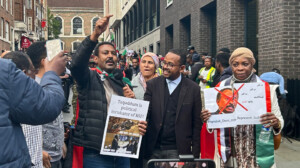Appointment of new governors triggers protests in Sudan
The long-awaited appointment of civilian governors in Sudan has elicited divergent responses in the country.
Large sectors of the Sudanese society welcomed the new walis, considering the replacement of the acting military governors with civilian counterparts as a fulfilment of one of the demands of the Revolution, while a number of states witnessed protests against the selected state rulers.
 Feminists protest the weak representation of women in high-level government positions, Khartoum, July 23 (Social media)
Feminists protest the weak representation of women in high-level government positions, Khartoum, July 23 (Social media)
The long-awaited appointment of civilian governors in Sudan has elicited divergent responses in the country.
Large sectors of the Sudanese society welcomed the new walis, considering the replacement of the acting military governors with civilian counterparts as a fulfilment of one of the demands of the Revolution, while a number of states witnessed protests against the selected state rulers.
On Wednesday evening, Prime Minister Abdallah Hamdok announced the names of the new civilian governors for the 18 Sudanese states. Two of them are women.
The “thorough selection process” was based on proposals of politicians and the Forces of Freedom and Change (FFC) in Khartoum and the states. The PM described their appointment as “the real start of change in the states”.
In order to prevent large street protests, the Khartoum state Security Committee closed the three bridges leading to the centre of the city on Thursday night “until further notice”.
In Red Sea state, Kassala, El Gedaref, and in North and West Kordofan, political forces and various society groups issued statements welcoming the new governors.
In El Gedaref, activist Jaafar Khidir commented by saying that Suleiman Ali was chosen by people in the state, according to a tight selection mechanism. “He has support among most political forces and civil society groups in the state,” Khidir said, and called on “everyone” to support the new governor, in order to achieve development in El Gedaref.
Sheikh Suleiman Ali Baitai, head of the Koran schools in Kassala’s Hamashkoreib, blessed the new governors in eastern Sudan. He calling for their support, and said “they will be held accountable without distinction for any act of discrimination based or skin colour or tribe”.
Protests
Kassala town however witnessed large protests against the new governor. The authorities closed the bridge over the El Gash river to contain the situation.
Sayed Tirik, native administration leader of the Hadendawa tribe in eastern Sudan, severely condemned the appointment of the new governor. He warned they will increase the protests “until Khartoum reverses its decision”.


In El Obeid in North Kordofan and Ed Daein in neighbouring East Darfur, people took to the streets in protest against the appointment of governors not nominated by the FFC in these states.
The FFC in Ed Daein stated that the new governor “does not represent the Revolution and the street”. They adhere to the candidates listed by the East Darfur Nominations Committee. “The appointment of Mohamed Eisa will unsettle the political and social scene in the state,” they said.
Feminist groups in Khartoum organised a vigil in Khartoum in protest against the underrepresentation of women among the selected governors, and the absence of women in the list of candidates for ambassadors abroad.
One of the participants told Radio Dabanga that they plan to invigorate their calls for more women on high-level government positions “by various peaceful means” in Khartoum and the states in the coming days.
Quotas
The Sudanese Professionals Association (SPA) expressed its reservation about the partisan quotas used for the selection of the new state governors, and wondered why the criteria and considerations related to the qualifications of the candidates were overruled.
‘The distribution of governors posts seems to reward individuals and political parties’ – Sudanese Professionals Association
In a statement on Thursday, the SPA denounced the views of the FFC and other stakeholders in a number of states and the poor representation of women. “The distribution of governors posts based on quotas seems to reward individuals and political parties”.
The association, the driving force behind the uprising that led to the ousting of President Omar Al Bashir in April last year, warned the government that it risks losing legitimacy in this way. “The people have called for civilian rule since the December Revolution, and are very disappointed about the replacement of officials in form while the essence stays as it was.”
The statement said the SPA will continue its dialogue “with all forces seeking to complete the path of change”. The association hopes that the dialogue will be able to restore the “now weakened confidence of the Sudanese in the transitional institutions”.
‘Tactical campaign’
The National Umma Party (NUP), presided by El Sadig El Mahdi, reacted to the announcement of the new governors, by withdrawing its members from their posts at the state governments.
In a press conference in Omdurman on Thursday, NUP leader and son of El Mahdi, Siddig El Sadig, accused the government of violating the agreed principles by appointing governors with a military background for fragile states such as East and West Darfur, and Kassala and El Gedaref. He warned that this may lead to armed conflicts in both regions.
Siddig Ismail, the party’s new deputy leader, said his party refuses to participate in “building state rule” that is not accepted by the public, he said, and announced “a tactical campaign to inform the people about the dangers that surround the homeland as a result of [this] paralysing fabrication”.
In a proposal to the Prime Minister presented weeks ago, the Umma Party stated that a state governance law should be developed first. “The candidates for the state governor posts should meet the conditions for competence, justice, and public support.”
Governors should also be selected on the basis of the extent of fragility of the state, gender, and political parties. The Umma Party proposed non-partisan governors for the “eight fragile states”, two women governors, and eight others for partisan participation, including four seats for the NUP. The new wali of Khartoum state should be subject to efficiency standards.
‘We sought to reach the maximum level of consensus’ – Sovereign Council member Mohamed El Faki
‘Difficult’
Member of the Sovereign Council Mohamed El Faki told reporters in Khartoum on Thursday that the selection of civilian state governors was “a difficult struggle”.
It was impossible to agree on names that would satisfy everyone for 100 per cent, he stated. “We sought to reach the maximum level of consensus.”
Minister of Information and government spokesperson Feisal Mohamed Salih explained that “the selection phase was a hard one, due to many complications in the situation in a number of states”. He called on the people to accept and cooperate with the new walis, “in order to pass the transition period safely until free and fair elections will be held”.
According to Hamdok “partisan politics has been a major obstacle” for his transitional government established in September last year.
In his address to the Sudanese nation on the eve of the June 30 March of Millions, the PM promised to correct the course of the transitional period, stressing that all the demands mentioned in these memoranda are necessary “to put the locomotive of the Revolution on the right track”.
The transitional government would work to implement the demands of the people in “the next two weeks”, he said. Ten days later, seven cabinet ministers were replaced.
The Sudanese people expected the acting military governors appointed by the regime of ousted President Al Bashir to be replaced by civilian state managers soon after the formation of the new government.
Yet, in the peace negotiations between the government and the rebel movements that started in September as well, it was agreed that new, civilian governors would only be selected after the signing of a comprehensive peace agreement.
In April this year, the rebel groups in principle agreed on the appointment of civilian state rulers. In early July, the government and the armed movements agreed on replacing three to four federal ministers and two members of the Sovereign Council in favour of the rebels. A final peace agreement is expected to be reached in the coming week.
Radio Dabanga’s editorial independence means that we can continue to provide factual updates about political developments to Sudanese and international actors, educate people about how to avoid outbreaks of infectious diseases, and provide a window to the world for those in all corners of Sudan. Support Radio Dabanga for as little as €2.50, the equivalent of a cup of coffee.












 and then
and then